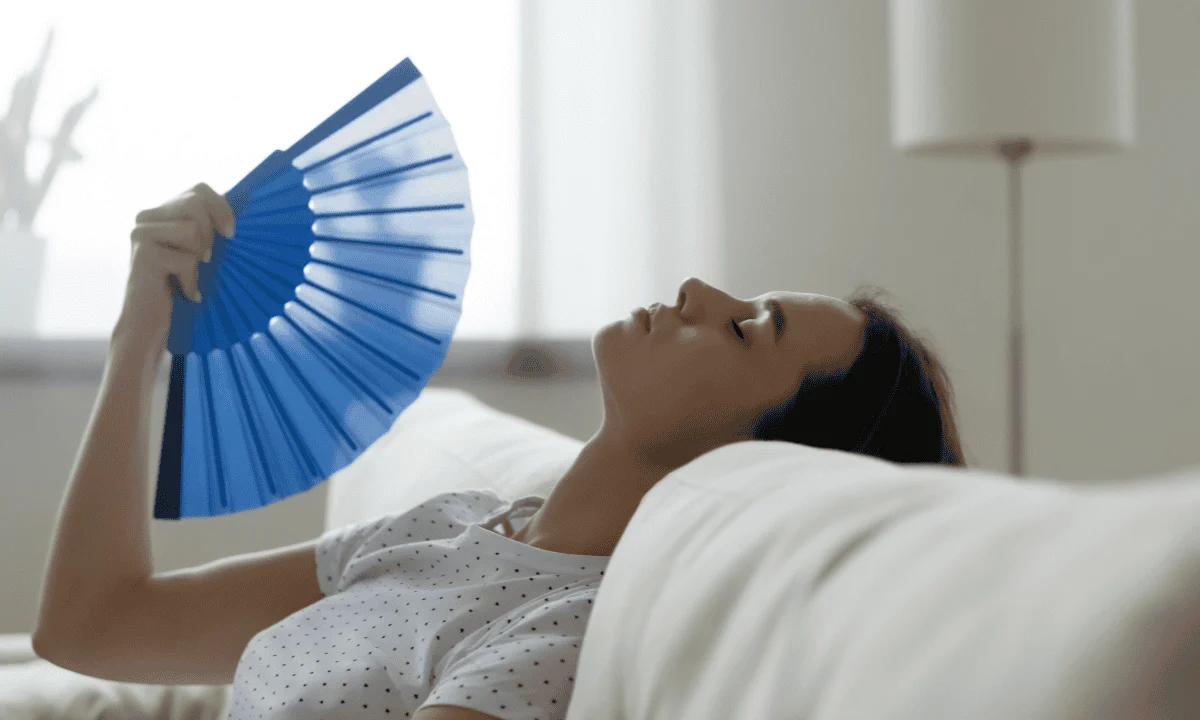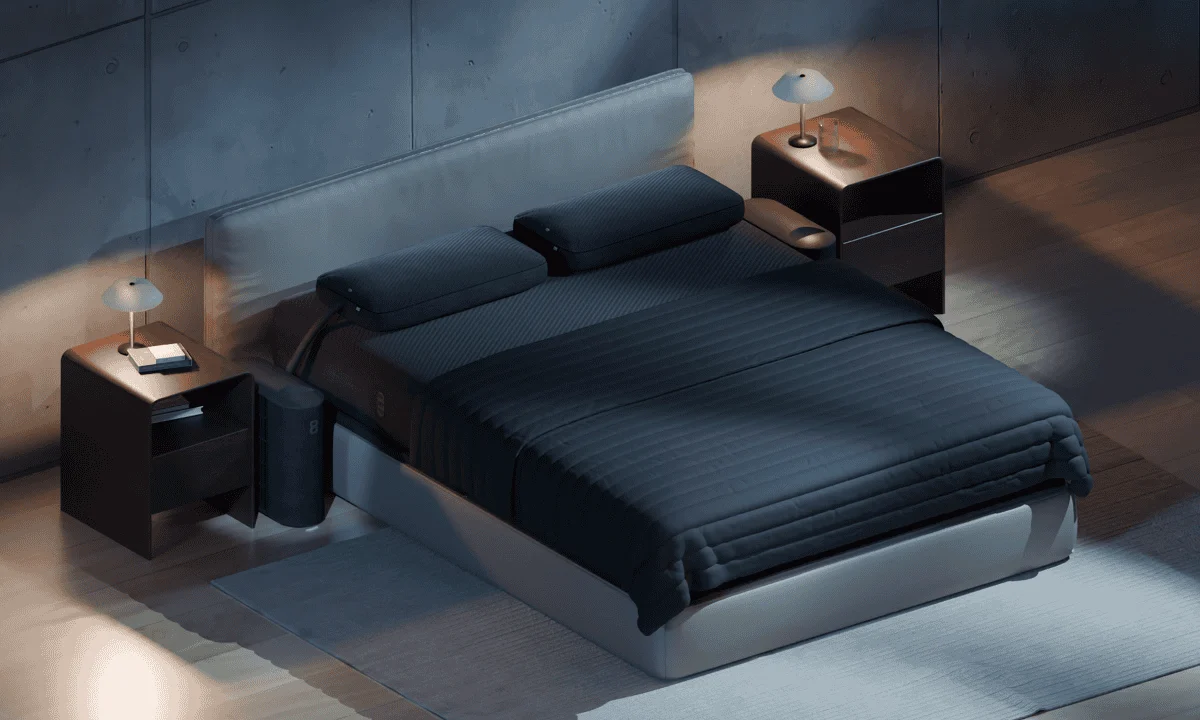- How To Stop Night Sweats - November 28, 2025
If you’re reading this, we’re betting that you’ve been waking up drenched in sweat. It’s a frustrating and uncomfortable situation to find yourself in. Your clothes are stuck to your skin, your bedsheets are soaked, you’re up in the middle of the night changing – again.
You’re not alone; night sweats affect up to 41% of people in a primary care setting. Yet, this isn’t an idea that’s talked about openly, which can feel strangely isolating. The good news is, once you know what’s causing your night sweats, it’s often easily fixed. So how to handle this, if you’re one of the 41%? Here are a few simple, science-backed ways to keep your nights cool, from the everyday to the tech-driven.
First: What Causes Night Sweats?
There is no one cause of night sweats, which makes it that much trickier to find a resolution right away. They can occur due to normal bodily overheating, but they can also be caused by underlying medical conditions such as:
- Menopause or other hormonal changes
- Infection
- Certain medications
- Anxiety
- Low blood sugar
- Thyroid conditions
- GERD
This isn’t even an exhaustive list of the possible systemic reasons for night sweats. Hormones especially are major culprits, especially in those with higher levels of estrogen. As estrogen cycles and fluctuates, it can affect the hypothalamus, the brain’s temperature regulator. This is why many become more reactive to even the smallest of temperature changes during menopause and perimenopause. Cortisol, known far and wide as our stress hormone, is supposed to be most active during the day, but chronic stress can activate it at night, leading to overheating.
As for blood sugar, a drop in glucose can actually trigger adrenaline, which raises body temperature and leads to sweating. People with diabetes and hypoglycemia often experience night sweats for this very reason.
All of this to say: night sweats can be complicated. If the suggestions in this article don’t change things for you, please speak with a medical professional to ensure that there aren’t other underlying causes affecting you.
That said, most people find that their sweating greatly improves, or completely goes away, once they make one or more of the following changes:
Avoid the Triggers That Spike Your Temperature
Caffeine, alcohol, and spicy foods are the most common food triggers responsible for night sweats. All three affect our body temperatures in ways you may not expect.
Caffeine boosts heart rate and metabolism, which generates body heat as you burn energy. This is possible even if you’re not feeling particularly wired when you lie down for the night; caffeine can actually remain in the system for up to 10 hours, long past when you’re ready to close your eyes for the day.
Alcohol is a vasodilator, meaning it widens the blood vessels. This increases blood flow to the skin, making you feel warm. It also interferes with REM sleep, the part of the sleep cycle that is most crucial for optimal brain function.
Spicy foods are often made with peppers and other spices containing capsaicin, a compound that causes you to feel hot and triggers the sweat response.
You don’t have to completely stop consuming these things, but timing is going to make all of the difference: don’t drink caffeine in the afternoon; skip that glass of wine with dinner, and avoid extra spice in your last meal of the day.
Heavy meals or eating too late can also produce heat. As your body digests, it produces heat, which raises your core temperature. If you have to eat within two hours of your bedtime, try to keep those meals light and easy to digest. You’ll be glad you did.
Support Your Body
All day you’re producing wakeful hormones like cortisol, serotonin, dopamine, and histamine. If your body isn’t taken care of, the production of these hormones can become uneven and result in sleep problems like night sweats.
To manage the production of these hormones, it’s important to exercise regularly. Exercise helps to regulate the nervous system, and to stabilize temperature signals within the body. In fact, exercise helps to support overall hormone balance. As it is with food, timing is important here, too: an intense workout too close to bedtime will actually cause a spike in endorphins that keeps you awake.
Winding down before bed is a very overlooked but important step in any nighttime routine. Activities like stretching, journaling, or deep breathing and meditation can help to lower stress and cortisol before you close your eyes. When your stress response has calmed, your body will calm.
Setting up a clear line between your daily grind and bedtime also helps with calming the body. You can do this in a number of ways, but the point is to carry out the same routine each night; after some time, the body remembers consistent, physical signals for winding down.
Sometimes, a cooler shower or bath can work wonders. Taking one just after a warm (not hot) shower will trigger a natural temperature drop that will carry into bedtime. Just ensure that it’s not too cool – just like exercise, very cold temperatures can increase endorphins and actually wake you up.
All of these are simple changes that we often don’t think about, but they all lay the groundwork for steady and comfortable sleep.
Optimize Your Sleep Environment
Sometimes, it’s as simple as adjusting a few things in your sleeping space.
For one, ensure that your room temperature is cool and ideal for sleep, around the recommended 60–67°F (15–19°C). This can be done using air conditioning, blackout curtains to block sunshine and heat, or lowering the thermostat just before bed.
You also want to make sure that your skin can breathe by avoiding heavy quilts or comforters, and sleeping in lightweight, loose-fitting, moisture-wicking clothing. Tight clothing affects your melatonin levels and heart rate anyway, so it’s best to keep it breezy while you sleep.
Pay attention to airflow in your sleep space as well. If your room is cluttered or windows and doors are closed, air may not be able to move through quite as easily, which can trap warm air and lead to tossing, turning, and yes, sweating.
Use Breathable Bedding and Sheets
Polyester, microfiber, and other synthetic fabrics are often heavy and non-breathable, which leaves the body vulnerable to heat retention. Try instead to look into sheets made of natural fabrics like cotton, linen, or bamboo, as these wick moisture and allow airflow so that heat can actually escape throughout the night.
Of course, even the best sheets can only do so much. All bodies have temperature fluctuations throughout the night, and if yours swing through a wider range, just changing your bedding won’t fix the issue. This is where a tech option is a massive game changer.
The Tech Option: Smart Cooling Bedding
If you’d like to take the guesswork out of body temperature regulation, there are a number of options available that use tech to manage things for you. These options generally fit over the mattress you have and do a great job of keeping things under control throughout the night.
Of the many choices you’ll find, our personal favorite is Eight Sleep’s Pod. It’s a mattress cover that actively keeps track of your body as you sleep, heating and cooling in real time to ensure that you stay at the ideal sleep temperature. All adjustments are made according to sleep stage, heart rate, environment, and other natural body fluctuations. It cools your actual sleeping surface, rather than just the air around you, meaning that your body receives temperature help right at the source, where it’s needed.
If you’re part of a couple, this is an even better option, as the pod offers dual-zone control, so that each person’s side of the bed can be adjusted independently according to their individual needs. If you run hot but your partner runs cold, you’re still each getting the support you need without affecting one another.
The Pod boasts great social proof, too: About 1 in 4 people reported that using Eight Sleep’s solution resulted in fewer night wake ups, and about 1 in 3 reported deeper sleep. After all, when your temperature doesn’t need regulating, your body can instead produce the necessary hormones to help you fall asleep and stay asleep.
Tech options are pretty popular, as they actually solve the root problem of night sweats through intelligent design that is scientific and user-approved. You can’t get better than that.
One Last Word on Your Health
As mentioned before, a number of underlying causes can cause night sweats, too. If you find that nothing seems to be working, it’s a good idea to start tracking your patterns. Don’t just track when they happen, but also things like:
- How often do you wake up sweating?
- What do you eat or drink throughout the day?
- What medications or supplements are you taking?
- What time of day do you usually go to bed vs. what time do you wake up sweating?
- Are there any other triggers or symptoms occurring?
This can be a lot to track, but well worth it when you meet with your doctor. If you don’t want to track all of it by yourself, Eight Sleep’s Pod actually tracks a number of your health stats. You can even opt for their Elite tier to get an advanced look at possible symptoms like abnormal breathing or cardiovascular patterns.
Try Combining Strategies for Lasting Relief
Night sweats aren’t a simple problem, so the solution won’t necessarily be simple either. As you’re looking for your personal answer, don’t be afraid to try a few things at once. For example, cooling your body and your room before bed, relaxing with some herbal tea, and settling onto a bed that’s regulated for you by Eight Sleep’s Pod, can all work together to keep you dry, comfortable, and well-rested. It’s a matter of remembering that bedtime is a time to feel relaxed and at ease; if that isn’t happening, then restful sleep won’t happen either.
Conclusion
Taking care of yourself often calls for a little discomfort upfront, to reach full comfort in the end. Imagine waking up refreshed and happy, rather than damp and groggy – this can be you. With some daily tweaks and great support from the likes of Eight Sleep, you’re just a few winks away from the best–and driest – sleep you’ve ever had.



